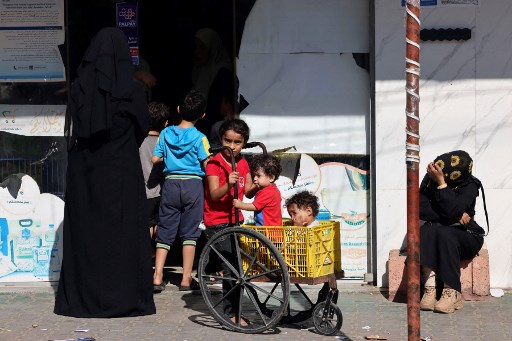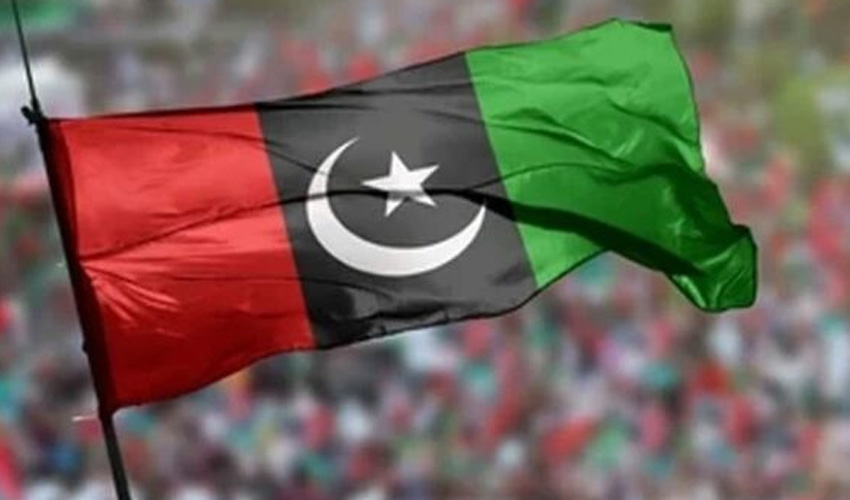The exchanges of fire erupted on the Israeli-Lebanon border seriously wounding an IDF soldier as Hezbollah reported six deaths.
The Israel-Hamas War entered on its 16th day. The IDF intercepted a ground-to-air missile from Lebanon.
In the first since the war began, humanitarian aid entered the Gaza Strip the UN says it's not enough while people termed it as a drop in the ocean and West Bank Palestinians termed it as just a ‘PR stunt ‘of global agencies.
Italy's prime minister met with Netanyahu in Israel as international leaders including US President Joe Biden and UK PM Rishi Sunak and the German Chancellor also [aid visits to Tel Aviv in wartime.
As per the latest toll, at least 1,400 Israelis killed since October 7 while the Gaza Health Ministry said 4,300 Palestinians were martyred some 13,000 were wounded and 85 Palestinians were killed in the West Bank.
In the latest raid on a refugee camp in the West Bank, 13 people lost their lives while 2 people were killed in a mosque attacked by Israel Air Force.
Israel vows to step up Gaza strikes before ground invasion
Israel's air force chief said he “wouldn’t want to swap places with our enemy and face an IDF division or brigade,” as the army continued with its plans for an invasion of Gaza.
Maj.-Gen. Tomer Bar’s comments were made on Saturday during a briefing of squadron commanders in preparation for the invasion.
At the briefing, Bar also said the Israel Air Force has struck Hamas with thousands of missiles.
He said Gaza is densely populated; the enemy has prepared a lot [for our invasion], but we are also preparing.
Israel's military has announced intensified strikes on Hamas-controlled Gaza ahead of a planned ground invasion, as the Pentagon said Sunday it was bolstering defences in the Middle East over "escalations" by Iran and its allies.
A first trickle of aid entered the blockaded Gaza Strip on Saturday, but the 20 trucks permitted to cross were described as a "drop in the ocean" given the "catastrophic" humanitarian situation for 2.4 million residents.
The military has pounded Gaza with relentless strikes in response to Hamas's murderous October 7 attack, in which militants killed at least 1,400 people, mostly civilians who were shot, mutilated or burnt to death, according to Israeli officials.
The bombing campaign has killed more than 4,300 Palestinians, mainly civilians, according to the Hamas-run health ministry, and reduced swathes of the densely-populated territory to smouldering ruins.
Over 40 percent of all housing has been damaged or destroyed, according to the UN citing local authorities, and Israel has halted the delivery of food, water, fuel and electricity.
Israel will now intensify its bombardment, to minimise the risks to its troops when they begin a ground invasion, military spokesman Admiral Daniel Hagari said.
"From today, we are increasing the strikes and minimising the danger," he said.
"We will increase the attacks and therefore I called on Gaza City residents to continue moving south for their safety."
Israel has warned more than one million residents of the northern part of Gaza to move south for their safety, and the UN says more than half the enclave's population is now internally displaced.
Bombardment has continued in southern parts of the Strip though, with Hamas authorities reporting nine killed in an airstrike in Khan Younis overnight.
Hundreds of thousands of civilians are believed to remain in and around Gaza City in the north, unwilling or unable to leave.
The conflict has raised fears of a broader regional war, and Washington said it would deploy defence batteries and additional Patriot battalions to protect US forces.
The Pentagon also said it was notifying additional troops "prepare to deploy orders" without specifying how many or when they could be dispatched.
Qatar negotiating for hostage releases
Israeli troops have massed on the border with Gaza and commanders visited frontline units on Saturday to rally troops.
"We will enter Gaza," chief of staff Lieutenant General Herzi Halevi told one infantry brigade on a visit.
"Gaza is densely populated, the enemy is preparing a lot of things there -- but we are also preparing for them," Halevi said.
A ground invasion poses myriad challenges for Israeli troops, who are likely to be confronted by Hamas booby traps and tunnels in a densely packed urban environment.
The safety of over 200 hostages abducted by Hamas is another complicating factor.
Two American hostages were released on Friday evening, after mediation from Qatar, which said more could be freed "very soon."
"We are taking a path that will very soon lead to release of the hostages, especially civilians," Qatari foreign ministry spokesman Majed Al-Ansari told the German Welt am Sonntag newspaper Saturday.
"We are currently working on an agreement under which all civilian hostages will be initially released," he added.
After negotiations and US pressure, food, water and medicine, but no fuel, crossed from Egypt into Gaza on Saturday.
The crossing closed afterwards, and UN officials warned much more was needed.
"Gaza was a desperate humanitarian situation before the most recent hostilities," five UN agencies said in a statement.
"It is now catastrophic. The world must do more."
First aid supplies in Gaza
“A first, but limited, shipment of life-saving humanitarian supplies from the United Nations and the Egyptian Red Crescent entered Gaza today on 20 trucks, passing through the Rafah Crossing.
“It will provide an urgently needed lifeline to some of the hundreds of thousands of civilians, mostly women and children, who have been cut off from water, food, medicine, and other essentials. But it is only a small beginning and far from enough. More than 1.6 million people in Gaza are in critical need of humanitarian aid. Children, pregnant women, and the elderly remain the most vulnerable. Nearly half of Gaza’s population are children.
“With so much civilian infrastructure in Gaza damaged or destroyed in nearly two weeks of constant bombings, including shelters, health facilities, water, sanitation, and electrical systems, time is running out before mortality rates could skyrocket due to disease outbreaks and lack of healthcare capacity.
The first UN supplies of water, food and medicine have entered Gaza.
— UNICEF (@UNICEF) October 21, 2023
To save children's lives, much more is needed.
We continue to call for a ceasefire to protect civilians and humanitarian workers, and ensure safe and sustained access to aid. pic.twitter.com/9s0KfefYsE
“Hospitals are overwhelmed with casualties. Civilians face mounting challenges in accessing essential food supplies. Health facilities no longer have fuel and are running on small amounts they have secured locally. These are expected to run out in the next day or so. Water production capacity is at 5 percent of normal levels. Pre-positioned humanitarian supplies have already been depleted. Vulnerable people are at greatest risk and children are dying at an alarming rate and being denied their right to protection, food, water and health care.
Nearly one-third of the population of Palestine was food insecure before this conflict in Gaza. Today, stocks in shops are nearly exhausted and bakeries are closing, while tens of thousands of people are displaced and unable to cook or safely purchase food.
“We call for a humanitarian ceasefire, along with immediate, unrestricted humanitarian access throughout Gaza to allow humanitarian actors to reach civilians in need, save lives and prevent further human suffering. Flows of humanitarian aid must be at scale and sustained, and allow all Gazans to preserve their dignity.
“We call for safe and sustained access to water, food, health - including sexual and reproductive health, and fuel, which is necessary to enable essential services.
“We call for the protection of all civilians and civilian infrastructure in Gaza, including healthcare facilities. “We call for the protection of humanitarian workers in Gaza who are risking their lives in the service of others.
“And we call for the utmost respect of international humanitarian law by all parties. “Gaza was a desperate humanitarian situation before the most recent hostilities. It is now catastrophic. The world must do more.”



























